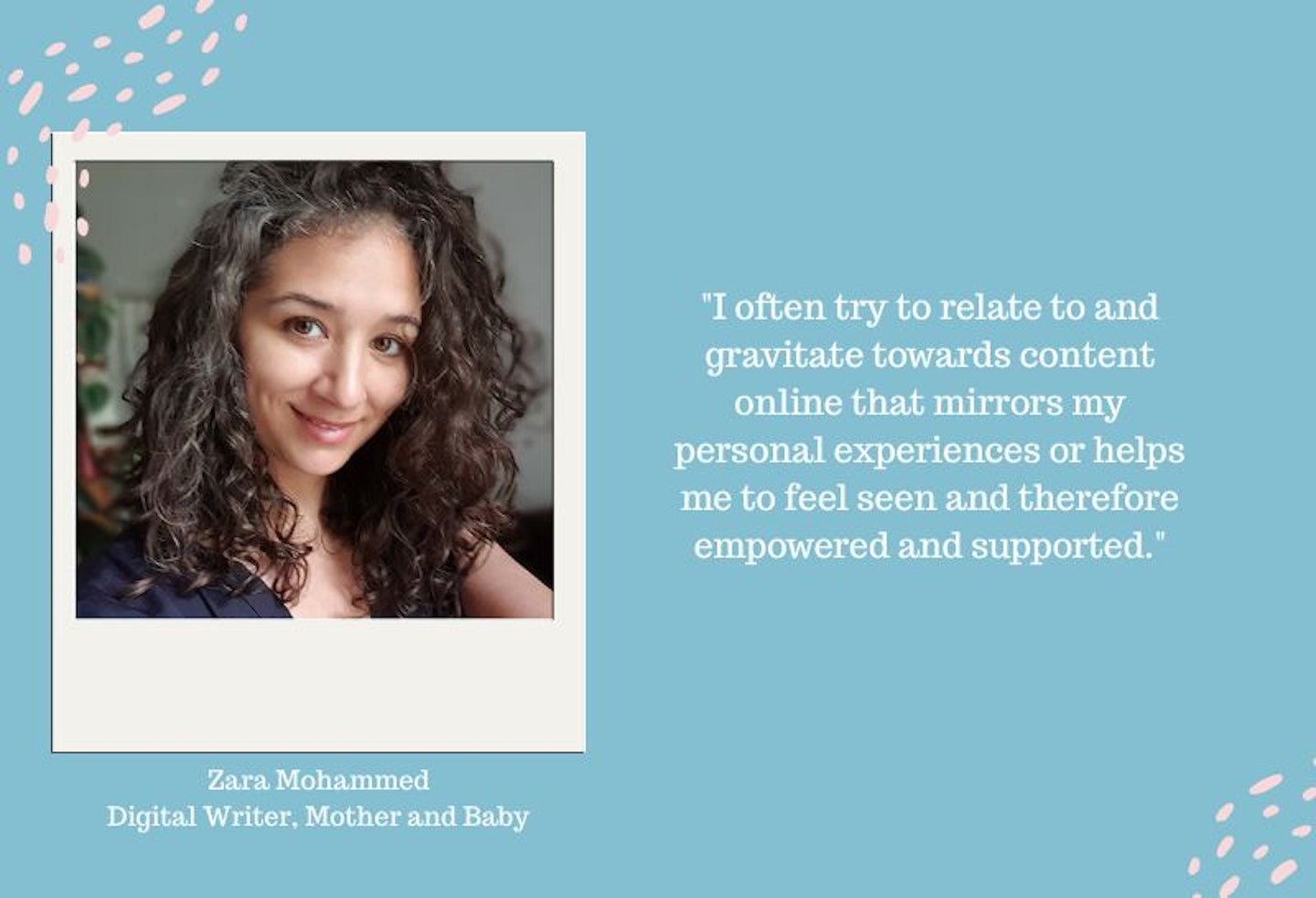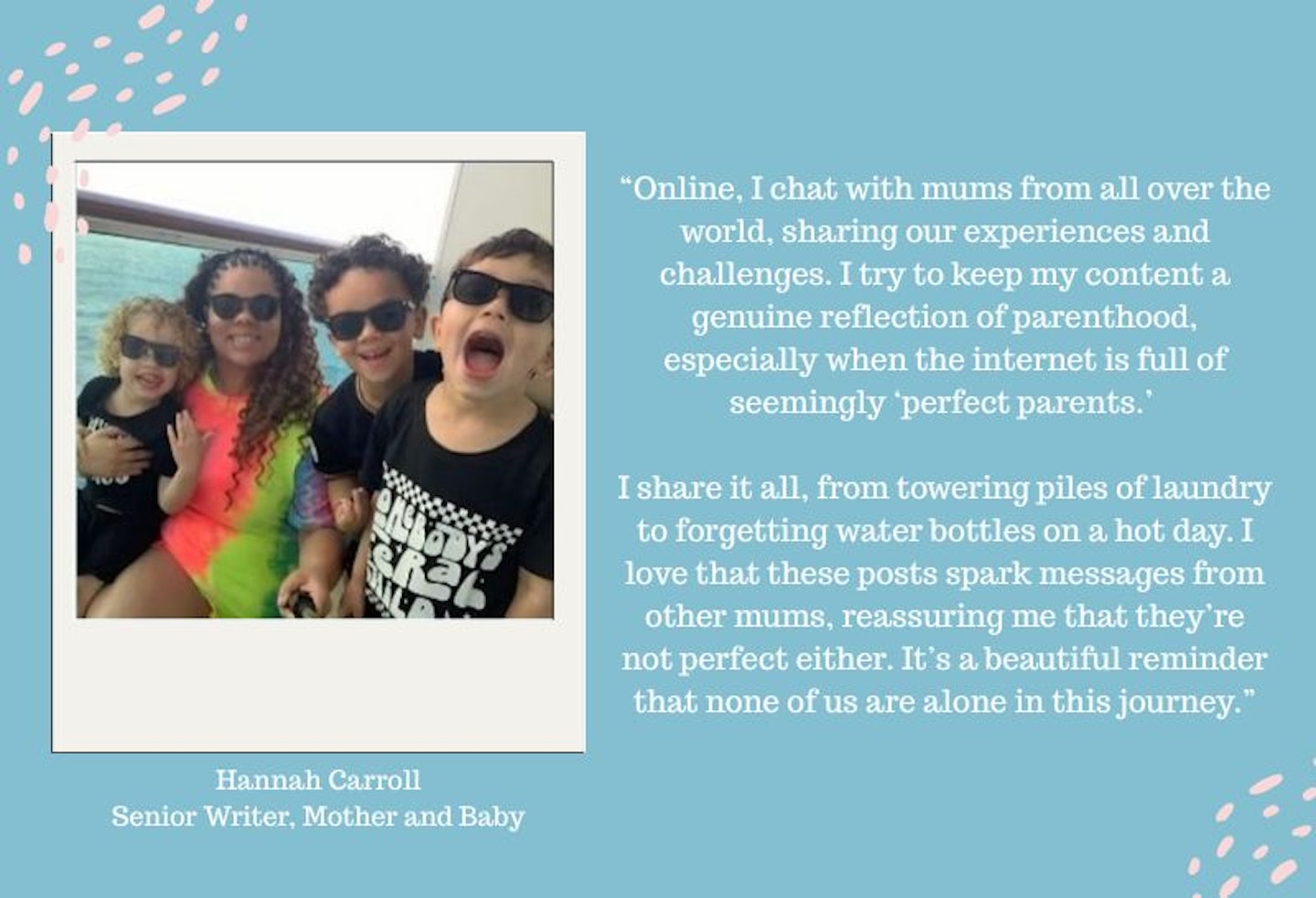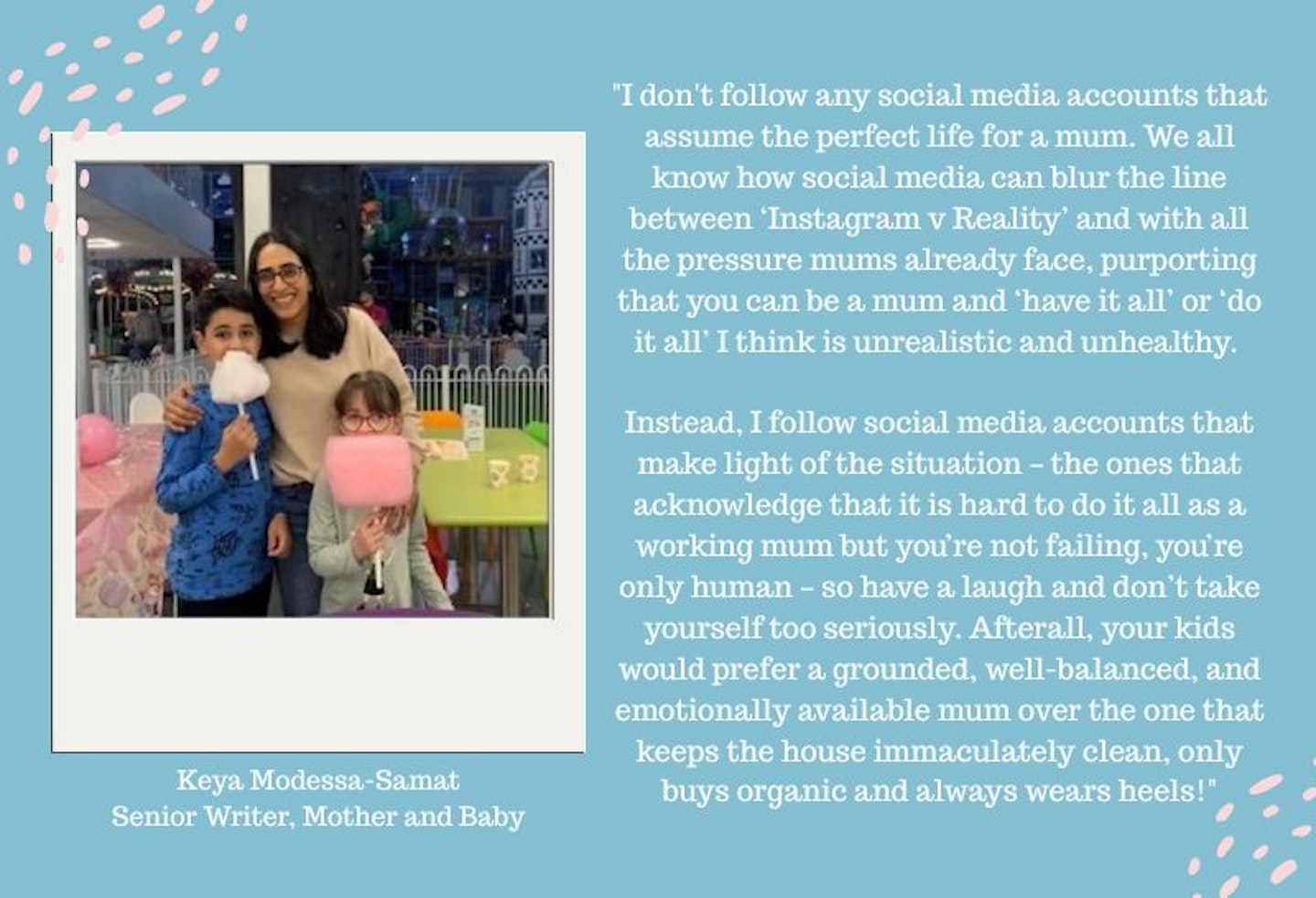Picture the scene. It’s 9am. In the last 3 hours you’ve made packed lunches, fed small children, dealt with a million-and-one questions about obscure topics, remembered it was ’take your favourite toy to preschool day’, put on a load of washing, unloaded the dishwasher, showered, brushed your hair, and had a cup of tea. You’re officially winning at parenting life.
Then you open your phone. You scroll through post after post of glossy mums and glossy children living glossy lives. Suddenly, you’re failing.
No matter how hard we try and how much time and effort we put into our parenting lives, there always seems to be someone on social media who’s doing it better. Who’s being and having it all.
But this comparison trap comes with real-life consequences. A study published in Frontiers in Psychology found that “social media use, negative emotions when comparing oneself to others on social media, and a high do it all discrepancy (feeling one should be able to do it all more so than perceptions that one can) were correlated with higher reports of work-related and parental burnout.”
It’s in our nature to compare ourselves to others, but social media gives us far more opportunities to do this, triggering increased feelings of guilt and inadequacy.
To find out how you can recognise the signs of mum guilt and burnout and learn to stop them in their tracks before they become a problem, we’ve drawn on the expertise of Kate Borsato, therapist and founder of The Perinatal Collective, Dr Anney Varghese FRCPsych, Private Consultant Psychiatrist & Coach, and Anna Mathur, Psychotherapist and author.
What is 'mum guilt' and why is it on the rise?
Mum guilt isn’t a new phenomenon. As Kate Borsato notes, it’s rooted in an impossible societal ideal of the ‘perfect mother’; a self-sacrificing woman whose work is devalued and who’s expected to take on the vast majority of the mental load. As mothers, we internalise society’s message – we must be perfect, we must do it all – and Kate points out that this creates a ‘burnout cycle’ where guilt drives over-functioning and self-sacrifice, leading to exhaustion or depleted mother syndrome.
Dr Anney Varghese agrees, "‘Mum guilt’ is the persistent sense that you’re never doing enough — whether that’s for your children, your work, or yourself. It’s driven by internal expectations but often reinforced by cultural messaging around what a 'good mother' should look like."
But as Kate explains, ‘mum guilt’ has become more of an issue in recent years, driven by the rise in social media and the endless examples we receive through our phone, day and night, of mothers who do seem to be ‘good enough’ and ‘doing it right’.
And no matter how often we remind ourselves that what we’re seeing is just polished snippets of people’s lives, Kate explains that our brains don’t always get the message. “The challenge is that our brain makes a really quick assessment, where we might know that what we're looking at isn't reality, but we still make this judgement that their life looks better than ours, and we must be doing something wrong. Even if we know, intellectually, that this is a highlight reel, that doesn't actually change how our nervous system reacts in that moment".
As Dr Varghese puts it, "our brains are wired to compare — especially under stress. When mothers are already stretched thin, these portrayals can activate a deep sense of shame or 'I’m not enough'."
Instagram versus Reality
In many cases, the issues arise if we consume social media content that misses the highs and lows of normal life and is overly polished or performative. As a quick scroll will show you, many of the portrayals of motherhood we see online and compare ourselves to just aren’t true to real life. As Dr Varghese explains, "Social media often creates a highlight reel — snapshots of clean homes, smiling babies, and effortless parenting". In fact, a study by parenting app Peanut found that 84% of mothers would like to see a more truthful, balanced depiction of parenthood online.
Kate agrees, “In reality, our lives are so nuanced - I've never met one person who feels just one single way about being a mum. It's always, ‘yes I love it, but also sometimes I don't!', or ‘this day was good and also rough’ or ‘this was the best transition and also kind of the worst’. That’s just life and the human experience. Many things, all at the same time. And they're all true."
Compare and despair
As parents, we know that our expectations of moments, behaviours or relationships don’t always match up to reality. Anna Mathur describes this as ‘quiet grief’; “the emotional ache we feel when the day, relationship, event, memory-making outing, doesn’t match what we imagined.”
As she goes on to say, “We thrive on predictability, so our brain tries to predict what will happen in order to bring a sense of safety and confidence in what might otherwise feel unknown. But the challenge comes when reality doesn’t match the forecast, even slightly, the brain flags it as a mismatch. You sense this tiny dissonance, a feeling of something being ‘off.’ When this happens repeatedly without being acknowledged (this is the important bit), your nervous system stores it as low-level stress. It’s not enough to trigger a full reaction, but it’s just enough to flatten your mood.”
If this is simply what our brains do automatically, then the added expectation of what the imagined day, event, or relationship should look like, thanks to what you’ve seen on social media, creates an even wider gap between hope and reality.
Alongside this risk of ‘compare and despair’, Kate tells us that social media use has the potential to harm our mental health in other ways. “We know that when we consume social media content, our self-esteem often takes a hit directly afterwards. Social media bombards us with information, ideas, things that we feel we should be doing and this creates a perceived gap or deficit in how we're showing up. It can also disconnect us from ourselves, so we are no longer in our body, we’re no longer in the present moment, and we know that that's not good for our mental health either".
From the cognitive overload of the sheer volume of parenting content online that can create mental fatigue, decision paralysis and increased anxiety, to the danger of disconnecting parents from their own values, instincts and definitions of success, it’s clear that social media can create many challenges for mothers.

But what about the positives?
Of course, while it’s important to recognise the dangers in the ‘compare and despair’ trap, social media can also be an incredibly powerful tool for good when we approach it in the right way. Kate explains that when we see a more balanced, nuanced, and realistic version of motherhood on social media, which some accounts certainly portray, it can provide “validation and an opportunity to feel less isolated, like this confirmation that you're not doing anything wrong by showing up as an imperfect human. There’s a lot of relief that comes from seeing other people struggling with the same things and hearing them put language to something you might be feeling but which you've never been able to articulate.”
Certainly, for many mothers, including many of the Mother&Baby team, social media has been a lifeline when they’ve felt alone or lost. For Senior Writer, Hannah Carroll, it’s allowed her to create a ‘virtual village’; “As a single mother of three with my family living nearly two hours away, I’ve had to navigate parenting without the traditional ‘village.’ When I became a parent, I wasn’t prepared for just how isolating it could feel. Thankfully, social media and WhatsApp groups became lifelines, helping me connect with other parents in similar situations. Over the past seven years, I’ve not only built strong friendships but also grown my own social media page to over 1,000 followers. While that’s a modest following in the grand scheme of things, it’s far more than the four close friends I regularly see in person.”

Dr Varghese agrees that when "used mindfully, social media can be a lifeline — especially for mothers who are isolated, neurodivergent, or navigating culturally complex parenting roles. It offers visibility, connection, and a sense of shared experience. The key is using it to create a “virtual village” that reflects your reality, not one that distorts it. Finding voices that resonate, stories that validate, and communities that support — that can be incredibly empowering."
How can we use and consume social media in a healthy way?
Kate suggests the following steps to help you consume social media in a way that's healthy and beneficial for you:
#1 Ask yourself ‘is this helping me? After a scrolling session, put your phone down and ask yourself how you feel. Sometimes you might feel good, but other times what you’ve seen online will have affected your overall happiness or left you feeling irritated or low.
#2 Set some boundaries. This could mean clear time limits, and you can hold yourself accountable by telling a friend or downloading an app that limits your phone usage. Dr Varghese also suggests setting micro boundaries, for instance, no scrolling in bed or choosing one block of time in the day to be online.
#3 Curate your content. You can also be more mindful about curating the content you see and don’t be afraid to block or mute anything that leaves you feeling flat. Even if the person you're following is generally positive, it may not leave you feeling happy or upbeat about your own life. Don't be afraid to use that unfollow button.
#4 Consuming social media in a way that's helpful. Choose content that helps you to live a life that’s aligned with your values and that helps you learn about things that you want to learn about, versus following content that just creates pressure. As Kate puts it, it’s about noticing, ‘Does this create motivation and insight or does it make me feel pressured and not good enough?’
Reframe your relationship with social media
Kate offers her tips on how you can reframe your relationship with social media and protect your sense of self while enjoying other people's content online.
#1. Parenting is not black and white. What works for one person might not work for you and that's okay. Everyone's lives and children are so different, but this becomes oversimplified online.
#2. Remind yourself that what you see is the highlight reel. It's important to take a step back and remind yourself daily that what you're seeing is a highlight reel that someone has probably thought a lot about, edited a few times, thought about it a little more and then put out to the world. It’s not messy like real life.
#3. Create your own definition of a 'good mother'. Social media takes us out of ourselves, so it's important to ask yourself, ‘What do I actually care about?’. What does being a good mother look like to you? If your children go to school in mismatched socks every day, that's fine. You may want to spend your time doing something other than matching up socks. Challenge what you see and ask 'Do I actually care about this?'

How to spot the signs of burnout and find support
While mum guilt can often be dismissed as just another part of the parental journey, Dr Varghese notes that if these feelings are left unexamined, they risk developing into chronic stress or parental burnout, which she describes as "a state of emotional depletion where you feel numb, reactive, or disconnected from your role."
She suggests the "warning signs often show up subtly: you’re irritable over small things, you feel emotionally distant from your children or partner, or you’re mentally exhausted even after resting. Burnout isn’t just about doing too much — it’s about carrying too much emotional weight alone."
Kate notes that red flags can be a sense of constant overwhelm, irritability, mum rage, disconnection, sleep or appetite changes, or feeling like you’re surviving rather than thriving. "Some feelings of anxiety and overwhelm are normal for everyone, but it's really important to ask yourself if these feelings are getting in the way of your life, disrupting your relationship, or causing you to not show up in the way that you want to. If so, then we want to look for more support".
If left unchecked, it could lead to perinatal mental health problems, so it's important to recognise the warning signs and seek help. As Kate says, "it's a problem when it becomes a problem", so if mum guilt or burnout is impacting your daily life, now is the time to ask for help. Kate suggests finding therapist support groups or reading self-help books. There are a number of support groups that can help you access the support you need, including Mental Health UK, Action for Children, Mind, or by speaking with your GP.
It's also important to treat yourself with the kindness you'd offer a friend; Kate tells us that a tool to manage mum guilt can be practising self-compassion. "Self-compassion is not just being nice to yourself, and it's not toxic positivity. It's actually a tool that we know regulates our nervous system by creating an internal sense of safety, rather than criticism. This can help us manage mental health challenges like burnout, anxiety, depression and of course guilt."
So how do we learn self-compassion? Imagine you’re talking to your best friend, or someone you really love and who’s going through the same things you are. Maybe she’s feeling guilty or thinking she's not enough and she comes to you and says ‘I’m such a bad mum, I’m just not doing enough’. What would you say to her?
You’re not broken. You’re not failing. You’re trying — in a world that rarely reflects your effort back to you.
Dr Anney Varghese
As Dr Varghese reminds us, "Guilt is not proof that you’re doing motherhood wrong. Often, it’s proof that you care deeply. That said, you don’t have to carry it alone. Support is available — not just to help you cope, but to help you reconnect with who you are, not just who you’re expected to be."
About the experts
Kate Borsato is a psychotherapist and the founder of The Perinatal Collective. She specializes in helping clients manage anxiety and OCD. Kate is passionate about supporting people in reconnecting with their joy and authentic self, even amid the busy, challenging days of parenting.
Dr Anney Varghese FRCPsych is a Dubai-born British Consultant Psychiatrist and a Fellow of the Royal College of Psychiatrists (UK), an educator, coach and creator working at the intersection of mental health, neurodivergence, and burnout. She hosts social media Live conversations exploring stress, identity, and wellbeing — helping people feel seen, not just treated.
As a Psychotherapist, Author and mother of 3, Anna Mathur has a relentless passion to dream up fresh ways to guide fellow mums in tackling guilt, anxiety and overwhelm. Anna is an accredited member the BACP, with an MA in Psychotherapy and Counselling and 10+ years of experience. She is Times Bestselling author of six books, including Mind over Mother and Know Your Worth. Her latest book, The Good Decision Diary is due out in August 2025.
About the author
Rebecca Lancaster is a Digital Writer for Mother&Baby, drawing on ten years of parenting her two children to help others navigating their own parenting journey. As a freelance writer, she spent ten years working with leading lifestyle brands, from travel companies to food and drink start-ups, and writing everything from hotel reviews to guides to the best British cheeses. She’s particularly interested in travel and introducing her children to the excitement of visiting new places, trying different foods (less successfully) and experiencing different cultures.
